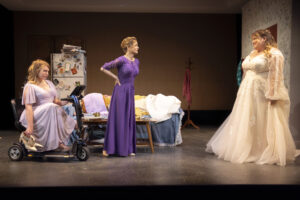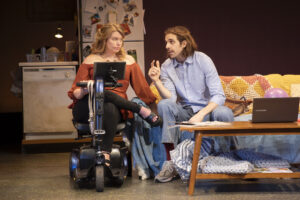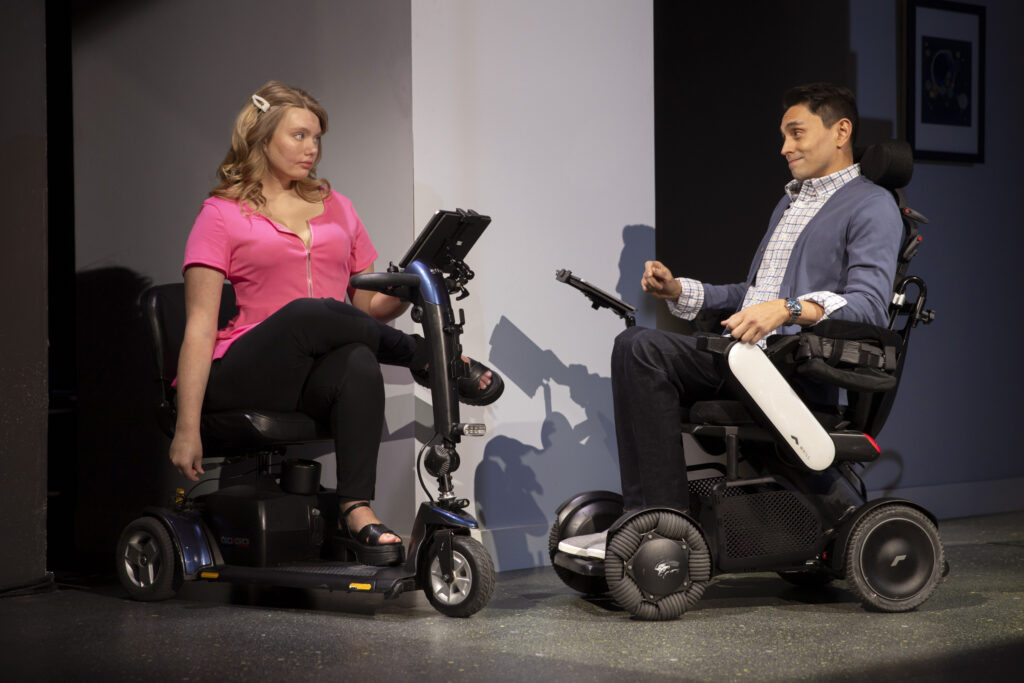Laura Winters’ endearing and appealing play All of Me, now running at The New Group in Manhattan, is a wonderful, subversive political commentary dressed in the festive trappings of a conventional rom-com.
It’s got a charming young couple who “meet cute,” spar comedically, find their relationship is impossible, and hurtle towards a happy ending. Yet here’s the unique situation: the couple Lucy and Alfonso are both disabled, confined to a motorized scooter and wheelchair, respectively, and have to communicate via AAC (augmentative alternative communication). Since neither can speak well, they must communicate by inputting what they want to say into a tablet, which then speaks the words. Lucy who was a singer before she acquired the condition that robbed her of her mobility and will ultimately silence her voice, relies on the AAC, perhaps more than she needs to—to the frustration of her family.

What’s subversive and political about this is that in adding this element to an otherwise sometimes conventional narrative, Winters demands that we see all of these people with disabilities. She gently but firmly guides the audience into seeing and acknowledging Lucy and Alfonso as full people not solely defined by their physical conditions. While those may create challenges, they both have indomitable spirits, needs, and fully realized humanity. They are neither noble nor suffering; they are doing the best they can with the cards they have been dealt.
The piece goes further than that, however. Winters examines how families and caretakers play a role in limiting the abilities of the differently abled, but she does so with abiding compassion and shows that sometimes these individuals are limited, flawed, and loving. The vain hope that at some point the disabled person will suddenly be “normal” is common. (Full disclosure, my family has disabled individuals, and I watched what is essentially a kind of coping mechanism) play out in my own home and others throughout my youth.) And yet, there is human comedy to be found, and Winters does it deftly, particularly when choosing the often-trivializing rom-com genre—and all the attendant tropes.

Lucy and Alfonso meet outside a hospital where they are both receiving treatment. They banter, and it’s clear that there is a spark between them, though there are differences between them, too. Winters plays with the trope of the rich man meets the poor girl. Alfonso is successful and has all the services he needs while Lucy lives at home in a house needing repair and inadequate support for her mobility needs. This last point creates a truly gasp-inducing event. Lucy is acerbic with an edgy humor, while Alfonso is more complacent—and charmingly goofy. This classic, oil-and-water matchup, however, ultimately finds its own level, with the added twist that Lucy is inspired to move beyond her condition and break free of the internalized and external forces that could limit her.
Ashley Brooke Monroe directs with sensitivity and subtlety, which mines the situation for comedy but is always loving and sympathetic to the characters. If it takes the audience a moment to adapt to the pace of the AAC communication, that only serves the comedy better when Lucy and Alfonso’s conversation turns, hilariously, a bit blue. Monroe makes use of the scooter and wheelchair for both drama and comedy, all of which deepens the audience’s connection with the characters.
It’s not just Lucy and Alfonso who emerge as fully people in the piece. Connie, Lucy’s mother, too, has to cope with the realities of caring for an adult daughter and trying to cope with all of that. Lucy’s sister Jackie and her boyfriend Moose are also in the house. They, too, are struggling to make a life for themselves. Moose is trying to help but ends up going down a questionable path, which points up the strains a disabled person puts on a family’s finances. Jackie wants to sing, though she’s never as good as Lucy once was, but Jackie and Moose’s wedding offers Lucy an opportunity to overcome her own fears. Alfonso’s mother Lucy has her own battled with denial and her own coping mechanisms. She too has to overcome her limiting belief system to allow Alfonso to live his life fully. Winters sets these all up beautifully, giving each character complexity and authenticity.
The cast is terrific. Danny J. Gomez as Alfonso is both sexy and kind. He has a gentle aura that makes room for Lucy’s more acerbic nature, at the same time finding it attractive. Madison Ferris as Lucy is an accomplished comedienne who knows how to use the AAC and a well-place glance to land every joke, while at the same time conveying the character’s longing. Lily Mae Harrington as Jackie fully inhabits the inherent conflicts of a woman who is both loving and frustrated while Brian Furery Morabito as Moose is charming and loving and we get the sense that he’s the only one in the house who really “gets” Lucy. Florencia Lozano is brittle and imperious as Alfonso’s mother, but that is merely a veneer. Kyra Sedgwick is stunning as Connie. She finds all the colors of love, anger, conflict, self-blaming, and heartbreak in the character.
Perhaps, though, what Winters’ play points out is that as appealing as Hallmark movies are to some, in the real world, happy endings can be messy, complicated, and fraught with reality. Throwing a little grit in with the sugar may, as in this case, serve to make the ending even happier.
All of Me
The Pershing Square Signature Center
480 West 42nd Street
Tues-Fri 7:30 p.m.; Sat 8 p.m.; Sun 2 p.m.
$29-$89 through The New Group
2 hours, 15 mins, 1 intermission
Pictured above: Madison Ferris and Danny J. Gomez
Production photos by Moinique Carboni
Posted May 18, 2024









More Stories
Broadway Review: Art
Fall Arts Preview: Emus, Foxes and Eric Clapton, Too
Diane DiMassa Book Event September 25